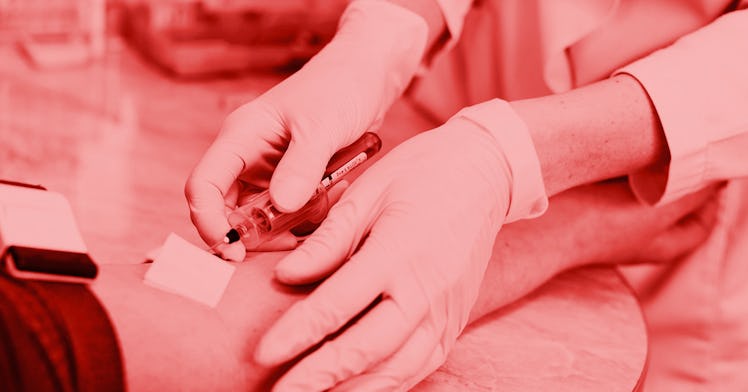Blood Type Could Affect COVID Risk. Should You Get Tested for Your Type?
People with type A blood have a higher chance of getting severely sick with COVID-19, according to a new study. But in reality, that doesn’t change anything.

According to a new study, people with type A blood have a 45% higher chance of getting severely sick if they catch the coronavirus compared to other blood types, and those with type O blood have a 35% less chance. But don’t rush out to get your blood type tested. Although this finding makes it sound like blood type is a major COVID-19 risk factor, it’s not. “In terms of trying to categorize your risk for any disease, including COVID-19, there’s really not a need to assess your blood type,” says Eric Gehrie, a professor of pathology at Johns Hopkins Medicine and medical director of the blood bank at The Johns Hopkins Hospital.
Only a small proportion of people who get COVID-19 become seriously ill. Although a 45% increased risk for people with type A blood seems like a lot, it doesn’t have a large effect on any individual person with type A blood, says Parameswaran Hari, a professor of hematology at the Medical College of Wisconsin. “The vast majority of patients that get this are going to do well,” Hari says.
In comparison to other risk factors for COVID-19, blood type isn’t a big deal. Age and underlying conditions are probably much more important, Gehrie says. To understand why this is the case requires knowing how blood type affects health in general… which is that it doesn’t much at all. Studies in the past have linked blood type to medical conditions such as memory loss and stomach cancer. Those connections are real. They’re just not that meaningful, Gehrie says.
For example, people with type O blood have a lower heart attack risk. But everyone can get a heart attack. Having type O blood doesn’t mean you’re safe to guzzle bacon fat. Cholesterol and blood pressure are much more important in determining risk. Gehrie suspects this will be the case for COVID-19, too, but for age and underlying conditions.
The study itself, though well-designed, was not meant to prove a definitive connection between blood type and severe COVID-19, Gehrie says. The researchers investigated nearly 2,000 COVID-19 patients with respiratory failure at hospitals in the epicenter of Spain and Italy’s outbreaks. They scanned the patients’ DNA, looking to see if any genetic markers — some of which determine blood type — are more common in people who develop severe COVID-19. This type of research is called a genome-wide association study (GWAS), and it’s not designed to make definite conclusions. “GWAS isn’t to prove that one thing is caused by another,” Gehrie says. “These studies are hypothesis-generating by their nature.”
In other words, this research is not enough to warrant getting your blood type tested. “I cannot imagine that would be useful to do. It would probably be a waste of money,” Gehrie says. And if you happen to already know your type, don’t let it influence you either. “I’m blood group O, and I have not changed my behavior,” Gehrie says. “So I certainly wouldn’t recommend that anyone else should.” Though type O blood may give a small protective effect, those with it are still vulnerable to COVID-19. “On a personal basis, this means everyone is likely to get disease and should still be super careful about not getting it,” Hari adds.
The only time you need to know your own blood type is if you’re getting a transfusion, Gehrie says. But if you’re curious about your type? There’s an easy way to figure it out. Donate blood. Many donors give blood at their school or workplace, but those locations are shut down under the pandemic, so not enough people are donating. Giving blood helps people in need and satisfies your curiosity. It’s a win-win.